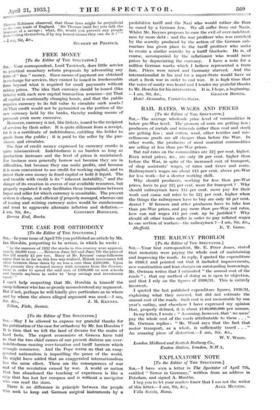FREE MONEY
[To the Editor of THE SPECTATOR.]
804—Your correspondent, Lord Tavistock, does little service to practical monetary reform proposals by advocating any
form of " free " money. Since means of payment are obtained in exchange for services, they cannot be issued in irredeemable form beyond what is required for small payments without
raising prices. The idea that currency should be issued (like tickets) with each new capital transaction assumes—(a) That all capital is continually changing hands, and that the public requires currency to its full value to circulate such assets I (b) That credit would not be pyramided on the portion of the new currency held by the banks, thereby making means of
payment -even more excessive.
Moreover, currency is not, like tickets, issued to the recipient of services by their seller. It is quite different from a receipt, for it is a certificate of indebtedness, entitling the holder to goods from the public ; it is paid to the seller by the pur- chaser, and circulates. , The fear of credit money expressed by currency cranks is quite misconceived. Indebtedness is no burden so long as iwoduction increases and the level of prices is maintained.
For business men generally borrow not because they are in difficulties, but because they can make profits, and because it is more convenient to use credit for working capital, and to invest their own money in fixed capital or hold it liquid. The real trouble with credit is its " inherent instability," and the danger of its creation in excess of our available resources, but properly regulated it only facilitates those transations between buyer and seller for which currency is unsuitable. The present system is cheap, and efficient if properly managed, whereas one of issuing and retiring currency notes would be cumbersome and tend to aggravate alternate inflation and deflation.—






































 Previous page
Previous page